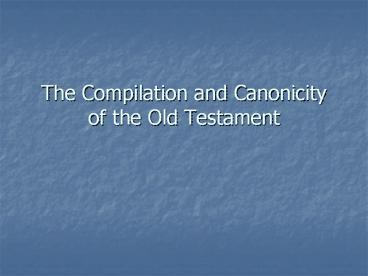The Compilation and Canonicity of the Old Testament - PowerPoint PPT Presentation
Title:
The Compilation and Canonicity of the Old Testament
Description:
The Compilation and Canonicity of the Old Testament Introduction to Canonicity Introduction to Canonicity: Defining Hebrew: hn#q* (kaneh) Used 62 times in 38 verses ... – PowerPoint PPT presentation
Number of Views:380
Avg rating:3.0/5.0
Title: The Compilation and Canonicity of the Old Testament
1
The Compilation and Canonicity of the Old
Testament
2
Introduction to Canonicity
3
Introduction to Canonicity Defining
- Hebrew hnq (kaneh)
- Used 62 times in 38 verses in the OT
- Greek kanwvn (kanon)
- Used four times in four verses
4
Introduction to Canonicity Defining
- But for the sake of greater accuracy I must
needs, as I write, add this there are other
books outside these, which are not indeed
included in the canon, but have been appointed
from the time of the fathers to be read to those
who are recent converts to our company and wish
to be instructed in the word of true religion.
These are . But while the former are included
in the canon and the latter are read in church,
no mention is to be made of the apocryphal works.
They are the invention of heretics, who write
according to their own will, and gratuitously
assign and add to them dates so that, offering
them as ancient writings, they may have an excuse
for leading the simple astray - Athanasius (Bruce, 79).
5
The History of the Old Testament Canon
6
The Nature of the Bible Timeline
- Zondervan NIV Atlas of the Bible, p. 216-217
7
The Nature of the Bible Timeline
- Zondervan NIV Atlas of the Bible, p. 216-217
8
The Nature of the Bible Timeline
- Zondervan NIV Atlas of the Bible, p. 216-217
9
History of the Old Testament Canon Compiling the
Books
The Hebrew Old Testament The Hebrew Old Testament The Hebrew Old Testament
The Law The Prophets The Writings
Genesis Exodus Leviticus Numbers Deuteronomy Former Prophets Joshua Judges Samuel Kings Latter Prophets Isaiah Jeremiah Ezekiel The Twelve Poetical Books Psalms Proverbs Job Five Rolls Song of Songs Ruth Lamentations Esther Ecclesiastes Historical Books Daniel Ezra-Nehemiah Chronicles
- From God to Us, p. 11
10
The Extent of the Old Testament Canon
11
Extent of the OT Canon Apocrypha
- Reasons for Inclusion
- Writers in the NT refer to its contents
- Septuagint
- Earliest complete manuscripts of Bible include it
- Early Christian art
12
Extent of the OT Canon Apocrypha
- Reasons for Inclusion
- Early Church Fathers
- St. Augustine
- Council of Trent
- Non-catholic usage
- Dead Sea community
13
Extent of the OT Canon Apocrypha
- Reasons for Exclusion
- Writers in the NT refer to its contents
- Never cite as authoritative
- Septuagint
- Compiled in Alexandria, Egypt in 4th century
- Earliest complete manuscripts
- Follow LXX, does not mean canonical
- Early Christian art
- Not canonical, historical
14
Extent of the OT Canon Apocrypha
- Reasons for Exclusion
- Early Church Fathers
- Early church fathers react against it
- St. Augustine
- Not determiner of canon
- Council of Trent
- Reaction against Reformation
- Non-catholic usage
- Not placed on same level as Scripture
- Dead Sea community
- Library, not determiner of canonicity.































